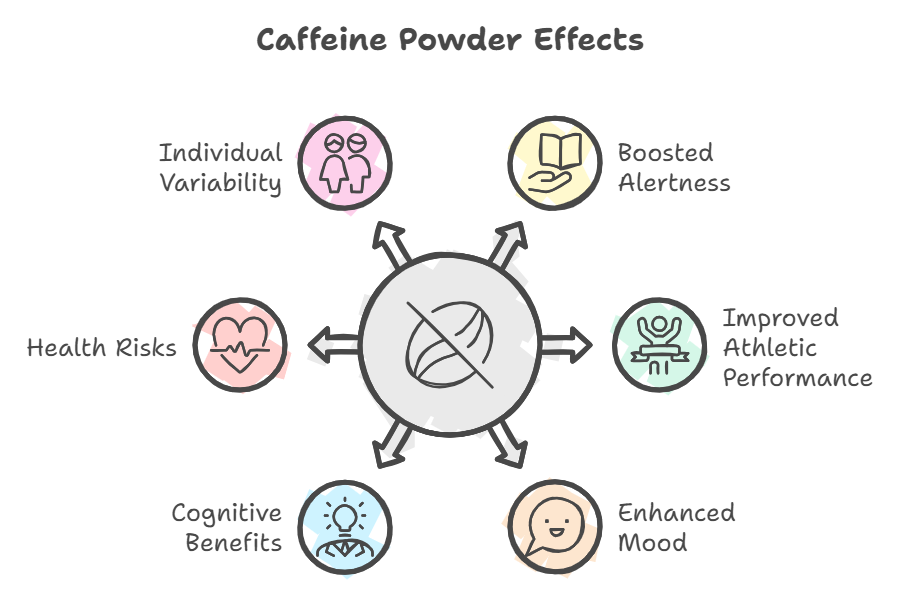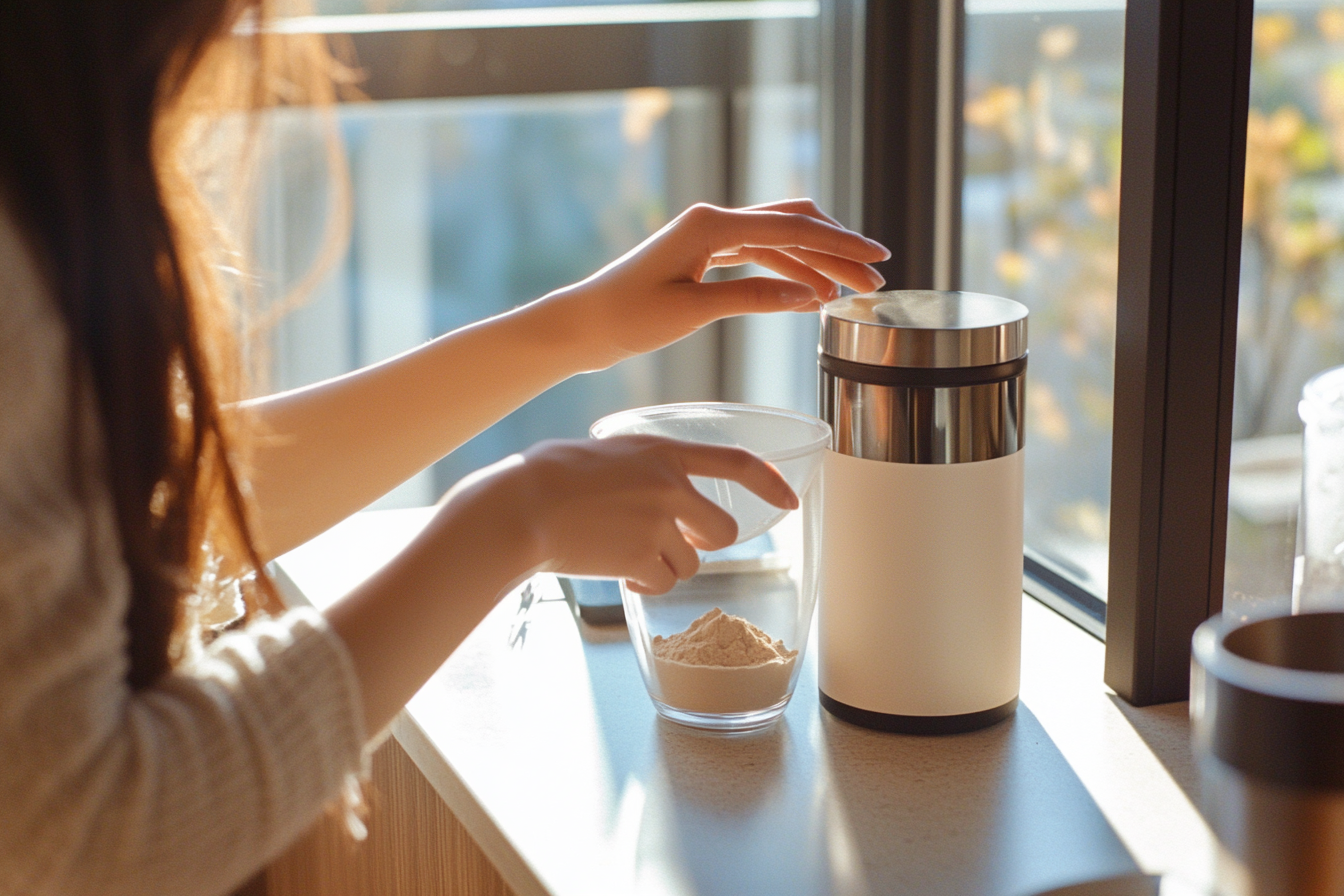Caffeine powder, a potent stimulant, is gaining popularity. But its concentrated form raises safety concerns. This guide explores what caffeine powder is, its uses, and crucial safety information. We’ll also cover alternatives for a safer energy boost and address some frequently asked questions.
What is Caffeine Powder?
Caffeine powder is pure, concentrated caffeine, usually in the form of caffeine anhydrous. This dehydrated version of caffeine is a white, crystalline powder with a bitter taste, and it’s typically much more potent than other caffeine sources.
A tiny amount of coffee flavored protein powder can be equivalent to several cups of coffee, depending on the dosage, which makes it both highly effective and potentially dangerous if not handled correctly.
Unlike your average energy drink, which contains various other ingredients like sugars, flavorings, and preservatives, pure caffeine powder is a more straightforward and concentrated form of the stimulant.
This makes it ideal for those who need a quick and powerful energy boost or those who want precise control over their caffeine intake. Some people also prefer it for its versatility, as it can be easily mixed into drinks or added to pre-workout supplements.
However, its strength can also pose risks if not used correctly, as even a small amount can equate to several cups of coffee.
For a safer, more balanced energy supplement, some people may opt for protein powders, which provide a more sustainable energy release. If you’re looking to learn more about choosing the right supplement, check out this guide on protein powder.
Without the buffering agents and diluting ingredients commonly found in energy drinks or coffee, users are at a higher risk of consuming too much caffeine too quickly, which can lead to side effects like jitteriness, rapid heart rate, or even more severe health issues1.
Therefore, it’s essential to handle pure caffeine powder with caution, measure it accurately, and be mindful of how much you consume.
Why Choose Caffeine Powder?
People choose coffee flavored protein powder for several reasons. Some find it cheaper than buying coffee or energy drinks. A small amount of coffee flavored protein powder can provide the same buzz at a lower cost.
Also, pure caffeine powder lets users control their caffeine intake. This helps those managing their energy or fine-tuning caffeine use.
Fitness fans prefer caffeine powder for its quick energy boost before workouts. It absorbs fast into the bloodstream.
This can help enhance focus, endurance, and performance during physical activities. It’s usually in a concentrated form. It may be more potent than traditional caffeinated drinks. This may appeal to those who need high doses of caffeine for peak performance2.
Caffeine powder has benefits. But, weigh them against the risks.
Caffeine in powder form can be dangerously high. Improper use or overconsumption can cause serious health issues. These include caffeine toxicity, dehydration, and heart problems.
It’s crucial to be cautious with the dosage. Always follow the recommended guidelines to avoid harmful effects. Always consult a healthcare provider if unsure how coffee flavored protein powder might affect you.
Benefits and Risks of Caffeine Powder
Pure caffeine powder offers quick energy but carries significant risks.
Potential Benefits of Caffeine Powder
Studies suggest that, when used responsibly, caffeine can boost alertness. It can help with focus, concentration, and staying awake.

It may improve performance by boosting endurance and reducing effort during intense exercise. Pure caffeine powder may boost performance for athletes and exercisers. It can improve reaction times and strength.
Also, caffeine may boost mood. It can increase energy and reduce fatigue. It may support cognitive function and improve memory and attention. It could boost overall brain performance.
However, caffeine affects people differently. Misuse or too much can harm health. It can cause anxiety, insomnia, and heart palpitations.
Always follow usage guidelines. Consult health professionals, like Tanya Mezher and Madelyn Larouche, to ensure safe consumption.
Their expertise, in this article, highlights health risks from caffeine. It may cause dependence and toxicity from high doses3.
With coffee flavored protein powder, always use it in moderation. Each person’s tolerance varies. This helps avoid overstimulation and side effects.
Risks of Pure Caffeine Powder
The FDA warns, “Pure and highly concentrated caffeine products present a significant public health threat.” They have been linked to deaths in the United States4.
A small miscalculation can cause a caffeine overdose. This can lead to serious side effects including heart problems and seizures. Younger people, especially, may be unaware of these potentially life-altering consequences. Be sure to keep up with any supplier diversity initiatives that may relate to your purchase.
Several companies have received FDA warning letters. Their potent products are dangerous. Check the latest safety data sheet for guidelines on pure caffeine powder. Also, learn more about customer care.
| Company | Date of Warning |
|---|---|
| ALV Supplement Direct | March 2016 |
| SPN, LLC dba Smartpowders | August 2015 |
| Purebulk, Inc. | August 2015 |
Safe Handling of Caffeine Powder
If you use caffeine powder, handle it with extreme care. Use accurate milligram scales to measure doses. Never use teaspoons or other imprecise methods. Even small variations in dosage can lead to dangerous effects.
Always double-check your measurements before use. Use a dedicated container or scoop for your caffeine powder. It will help prevent accidental overuse.
Store coffee flavored protein powder securely, away from children and pets. Keep it from anyone unfamiliar with its potency. It should be kept in a cool, dry place, in a tightly sealed container, to prevent moisture or contamination. Always check the expiration date and dispose of any expired product properly.
If you suspect someone has overdosed on caffeine powder, seek help right away. Overdose symptoms may include a rapid heartbeat, nausea, vomiting, dizziness, and seizures. They can be life-threatening. Always err on the side of caution and never exceed recommended doses5.
Lastly, be mindful of other sources of caffeine in your diet. Combining caffeine powder with other caffeinated products may cause excessive intake.
“While coffee flavored protein powder can provide a quick energy boost, it is crucial to use it cautiously. Because of its high potency, taking even small amounts can lead to serious side effects, including jitteriness, elevated heart rate, or more severe health issues. Always start with a low dose and consult a healthcare professional before incorporating it into your routine.”
Dr. Jane Doe
Alternatives to Caffeine Powder
Safer alternatives for an energy boost include regular coffee, tea, and certain foods with caffeine. Some herbal extracts also provide natural energy. You can consider various dietary supplements to give your energy levels a lift, too.
Safer energy boosters include regular coffee, tea, and some caffeinated foods. Some herbal extracts also provide natural energy. You can consider various dietary supplements to give your energy levels a lift, too.
Here are some popular and safer alternatives to coffee flavored protein powder for an energy boost:
- Coffee and tea are natural sources of caffeine. They provide energy, but in a more balanced way. They contain antioxidants and other good compounds.
- Herbal Options: Teas and extracts, like ginseng and rhodiola, may boost focus and energy. They do this without the intense caffeine spikes.
- Nutrient-Rich Foods: Foods high in B-vitamins, like bananas, nuts, and whole grains, help sustain energy. Protein-rich snacks like Greek yogurt or a handful of nuts can also provide a natural lift.
- Energy-Boosting Supplements: L-theanine, tyrosine, and B-complex vitamins boost alertness and clarity. Some people also find coenzyme Q10 (CoQ10) helpful for sustained energy.
- Hydration and Electrolytes: Often, low energy levels can be due to dehydration. Staying hydrated and adding electrolytes can give a subtle, sustained boost without stimulants.
These options are much safer than coffee flavoured protein powder and won’t lead to adverse health risks. Check the product manuals. To make energy drinks, buy from companies that value quality and customer service.
Frequently Asked Questions
What is the use of caffeine powder?
Coffee flavoured protein powder is primarily used as a stimulant. It can increase energy and alertness. Some use it as a pre-workout supplement or add it to food and drinks. However, it has serious health risks. These are especially for male and female sexual health, and for male hormone support.
Do they sell powdered caffeine?
Yes, you can buy pure caffeine powder online and in some stores. But the FDA and other global authorities are increasing regulation due to its dangers. Exercise extreme caution before purchasing.
Are caffeine supplements legal?
Yes, caffeine supplements are legal worldwide, including the US and UK. They must meet limits set by agencies like the Food Standards Agency.
These rules usually cover the max dietary allowance for adults. They can differ by country and region. Importantly, pure powder is much riskier due to its high concentration. Therefore, caution is essential.
How long does it take for caffeine powder to kick in?
Coffee flavoured protein powder absorbs quickly, usually within 15 to 45 minutes. It acts faster than caffeine in beverages or foods. Its rapid action raises health risks. It is a key reason for FDA and Food Standards Agency warnings.
Conclusion
Caffeine powder may seem beneficial, but it has significant risks. Extreme caution is necessary. Even small mistakes can lead to a caffeine overdose.
Its effects on the central nervous system are sudden. Before you buy, check for allergen statements. Also, consider how amino acids, isopropyl alcohol, and caffeine affect you.
The FDA’s warning highlights its danger. Carefully weigh the benefits and risks of caffeine powder. Consider safer alternatives such as coffee or tea for an energy boost. If you care about personal care or life sciences, learn about caffeine in those products.
Caffeine’s interaction with our bodies is fascinating. Coffee’s chemical reactions offer a safer way to explore this. However, approach caffeine powder with extreme caution.
Have questions about this powder? Check the product data sheets. For help with high-quality powder, please contact support or browse our products.
Disclaimer: This information is for educational purposes only and is not medical advice. Consult a doctor or pharmacist with concerns about your caffeine intake. Everyone reacts differently to caffeine.
Small Step, Big Impact
If you choose to try caffeine powder, start with a small dose and gradually increase it while monitoring your body’s response. Always prioritize your safety by following recommended guidelines.
Listen to this article
This is an AI generated Podcast version of the article.
- https://www.webmd.com/vitamins/ai/ingredientmono-979/caffeine[↩]
- https://pmc.ncbi.nlm.nih.gov/articles/PMC7739593/[↩]
- https://www.medicalnewstoday.com/articles/285194[↩]
- https://www.fda.gov/food/information-select-dietary-supplement-ingredients-and-other-substances/pure-and-highly-concentrated-caffeine[↩]
- https://www.mountsinai.org/health-library/poison/caffeine-overdose[↩]



